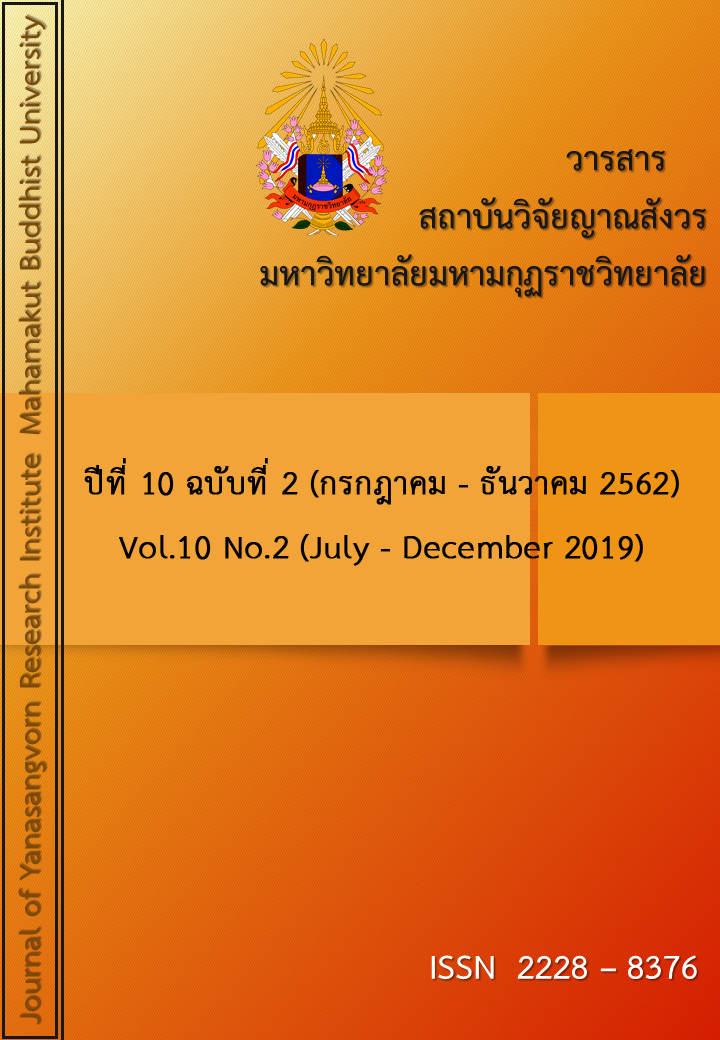THAI YOUTH ENGAGEMENT IN SCIENTIFIC INFORMATION IN OUT-OF-CLASS CONTEXT
Main Article Content
Abstract
Promoting scientific literacy is one of the educational focus to support innovative society in the national development plan. Science education in out of class context or lifelong science education also plays important role to ensure the inclusion of non-science students as well as youth outside formal school system, so that the members of the society are prepared for the rapid change in the science and technology. The purpose of this research is to study the lifelong learning of science of Thai youth especially in their acquiring of scientific information in out of class context. The data was collected from 3,064 youth aged 15-24 years old all over the country using questionnaire. The results were statistically analyzed using frequency distribution and percentage and showed that majority of 51% of the youth spent 1-4 hours per week learning science in out of class context while another 28% spent less than one hour, while their major source of science information is online media, especially Facebook. As much as 70% of youth agreed that certain degree of scientific knowledge is required for use in their daily life. About 79% said that they sometimes followed scientific updates information. Three major barriers to science learning from these out of class information were mentioned ; 1) the information was “too difficult to understand”, 2) the information was in other language (not Thai) and 3) the information was not fit their interests. Most youth agreed that the scientific information available nowadays was not adequate, while science related to climate change, energy, biotechnology, health, and biodiversity scored better in term of their communication. Scientists were the most reliable source of information among youth, followed by university academicians. This study suggested that Thai youth were still positive and showed willingness to science learning in out of class context, and expected to see more scientific information that was easy to understand and fit their interests. It is interesting to see that certain area of science and technology related to government policy were not a popular subjects. This result can be used for planning and developing in lifelong education to engage young generation to science and technology
Article Details
References
สำนักงานพัฒนาวิทยาศาสตร์และเทคโนโลยีแห่งชาติ (2551) ดัชนีด้านวิทยาศาสตร์และเทคโนโลยีของประเทศไทย ปี 2550. กรุงเทพฯ: สำนักงานพัฒนาวิทยาศาสตร์และเทคโนโลยีแห่งชาติ
สำนักงานเศรษฐกิจอุตสาหกรรม (2560) 10 อุตสาหกรรมเป้าหมาย กลไกขับเคลื่อนเศรษฐกิจเพื่ออนาคต (New Engine of Growth) กรุงเทพฯ: สำนักงานเศรษฐกิจอุตสาหกรรม
สำนักงานสถิติแห่งชาติ (2562) สถิติการศึกษา ปี 2560 (Online). http://statbbi.nso.go.th/staticreport/page/sector/th/03.aspx, 20 เมษายน 2562
สำนักงานสถิติแห่งชาติ (2562) สถิติเทคโนโลยีสารสนเทศและการสื่อสาร ปี 2560 (Online). http://statbbi.nso.go.th/staticreport/page/sector/th/16.aspx, 20 เมษายน 2562
สำนักงานสภานโยบายการอุดมศึกษาวิจัยและนวตกรรม(2562) สถิติกำลังคนด้านวิทยาศาสตร์เทคโนโลยีและนวตกรรมของประเทศไทย (Online) http://stiic.sti.or.th/stat/ind-lf/ind-lf-g001/lf-t003/) วันที่ 25 มิถุนายน 2562
อาชัญญา รัตนอุบล (2557) คำจำกัดความ แนวคิด และลักษณะการศึกษาตลอดชีวิต ใน สุวิธิดา จรุงเกียรติกุล (Ed) การศึกษาและการเรียนรู้ตลอดชีวิต. กรุงเทพฯ: สำนักพิมพ์แห่งจุฬาลงกรณ์มหาวิทยาลัย
China Research Institute for Science Popularization (2010) The Survey of Public Scientific Literacy, Beijing, China
Falk, J.H. and Lynn D.D (2010) The 95 Percent Solution : School is Not Where Most Americans Learn Most of Their Science, American Scientist, 98, 486-493.
Falk, J.H. and Needham, M.D. (2013) Factors Contributing to Adult Knowledge in Science and Technology, Journal of Research in Science Teaching, 50(4), 431-452.
Ipsos MORI (2014) Public Attitudes to Science 2014 : Main Report, UK : Department for Business, Innovation & Skills.
Laugksch, R.C. (2000). Scientific Literacy : A Conceptual Overview. Science Education, 84(1), 71-94
Ontario Science Center (2018). Canadian Science Attitude Research, Ontario, Canada (Online) doi:www.ontariosciencecentre.ca/Uploads/AboutUs/documents/Ontario_Science_Centre- Science_Literacy_Report.pdf .
Organization for Economic Co-operation and Development (OECD) (2006). OECD Annual Report 2006 : OECD Publishing.
Miller, J.D. (1983) Science Literacy : A conceptual and Empirical Review. Daedalus, 112(2): 29-48.
Miller, J.D. (1998) The Measurement of Civic Science Literacy. Public Understanding of Science, 7: 1-21.
Miller, J.D. (2012) Adult Science Learning in The Internet Era.Curator, 53(2) :191-208
National Science Board (2014) Science and Engineering Indicator 2014, Arlington VA: National Science Foundation.
Shen, B.S. (1975) Science Literacy and Public Understanding of Science In Communication of Scientific Information (pp.44-52) : Karger Publishers.
Yamane, T. (1967). Statistics, An Introductory Analysis, 2nd Ed., New York: Harper and Row
Department of Public Administration (2018) Statistics Registration System : Population and Household Statistics 2017 (Online) Retrieved March 15, 2018 from http://stat.dopa.go.th/stat/statnew/upstat_age_disp.php (in Thai)
National Science and Technology Development Agency (2008) Thailand Science and Technology Index 2007, Department of Science, Technology and Innovation Research, National Science and Technology Development Agency, Bangkok (in Thai)
National Statistical Office (2019) Survey on Education Statistics (Online) Retrieved April, 20, 2019 from http://statbbi.nso.go.th/staticreport/page/sector/th/03.aspx (in Thai)
National Statistical Office (2019) Household Survey on The Use of Information and Communication Technology (Online) Retrieved April, 20, 2019 from http://statbbi.nso.go.th/staticreport/page/sector/th/16.aspx (in Thai).
Office of Industrial Economics (2017) New Engine of Growth. Office of Industrial Economics, Bangkok (in Thai)
Office of The National Higher Education Science Research and Innovation Policy Council (2019) National Science and Technology Human Resources Statistics. (Online) Retrieved June 25, 2019 from http://stiic.sti.or.th/stat/ind-lf/ind-lf-g001/lf-t003/ (in Thai)
Ratana-ubol, A. (2014) Definitions, Concepts and Approaches in Lifelong Education in Jarungkietkul, S. (Ed) (2014) Lifelong Education and Lifelong Learning. Bangkok, Chulalongkorn University Printing House (in Thai)


